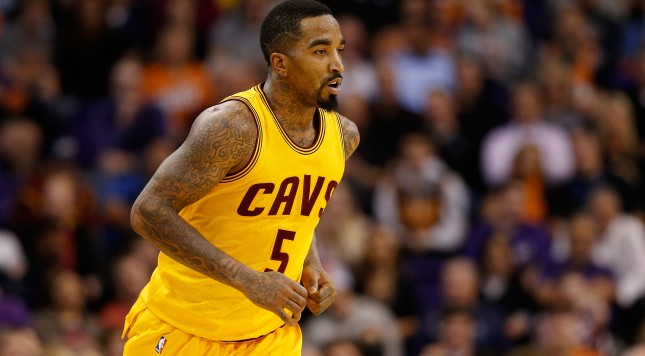The Golden State Warriors survived J.R. Smith in last year’s NBA Finals — mostly because they were better than the Cleveland Cavaliers, but partly because J.R.’s shot didn’t come alive until it was too late for his team.
Remember how Game 6 ended? It was seemingly a done deal midway through the fourth quarter. The Warriors grabbed a 15-point lead and had the game well in hand. Cleveland never gained a possession with a chance to tie, but it’s worth recalling that the Cavs did trim that 15-point deficit to only four with more than 30 seconds left.
J.R. went on a shooting spree:
Smith hit three triples in a game-clock span of under 50 seconds. Golden State needed to hit a few foul shots to tuck the game — and the series, and the Larry O’Brien Trophy — safely away.
When you look at that highlight video above, what’s worth noting is that Smith hit ridiculous shots. Smith is Cleveland’s high-degree-of-difficulty marksman. Channing Frye needs to be set up in catch-and-shoot situations due to crisp ball movement. Kevin Love requires the same thing. LeBron James needs to be able to tee up his threes, too. Kyrie Irving comes close to J.R. in terms of being able to hit impossible shots, but J.R. is more practiced at this inefficient art of basketball. He’s also not the defensive disaster Irving is.
Last year, I cited J.R. as the player the Cavs needed to step up in the Finals against the Warriors. This year, the bottom-line reality is the same, even if so many of the surrounding circumstances are different.
One year after the 2015 Finals, most of the focus will (rightly, I might add) shift to Love and Irving for the 2016 reunion, since they’re healthy and rested. The Cavs (not foolishly) felt two prominent big-name players could create a championship nucleus. No one could have known at the time of the Love deal with the Minnesota Timberwolves that Steph Curry would redefine basketball; Klay Thompson would become a better NBA player than Love; and Draymond Green would turn into a remarkably chameleon-like positionless defender.
The Cavs aren’t the underdog heading into these Finals because of what Kevin and Kyrie have failed to do; they’re the underdog because of what Golden State has done to make a great (2015) team even better one year later. Nevertheless, Love and Irving have to defend well enough to keep Cleveland in the fight. Responding to pick-and-rolls and other actions is the first, second and third key for the Love-Irving combo in this series. Few, if any, will dispute that.
Yet, one can still make the argument that J.R. Smith is the non-LeBron player the Cavs need to win their first world title.
*
It’s counterintuitive, but real: While the 2016 Finals might be a referendum on Love and Irving, Smith is the non-Bron figure the Cavs will need the most.
To be more precise, a good series from Love and Irving would enable the Cavs to push this series to six or seven. However, a good series from Love and Irving without meaningful scoring flurries from J.R. probably means the Cavs won’t win any more than two games in the Finals.
It’s a bottom-line reality, everyone: Klay Thompson and Steph Curry make so many shots other NBA teams and players fail to make. Klay and (especially) Curry make the game look easy with the kinds of threes they hit. That three-point proficiency ultimately differentiated the Warriors from the Thunder in the Western Conference Finals.
J.R. Smith isn’t Steph or Klay, but he’s the closest thing the Cavs have to those two luminous stars. Smith has to give the Warriors a dose of their own medicine. He has to make equation-changing shots against good defense, giving Cleveland a small taste of improbable excellence, not just “excellence from structure.”
It’s not as though Smith or Cleveland should seek out the tough three, but when a possession breaks down late in a game, J.R. will need to hit the kind of shot no one else on the Cavs, save Kyrie, can hit. This scenario will need to replicate itself at least once in order for the Cavs to win the whole thing, not merely extend the Warriors to six or seven.
Once again, we arrive at a Cavs-Warriors NBA Finals. We once again encounter a series in which high-degree-of-difficulty threes will be made. Steph and Klay will make most of them, and Kyrie some of them.
J.R. Smith will need to hit the biggest examples of them, precisely when the Cleveland Cavaliers face a fourth-quarter crucible.
The Cavs need something special to beat Golden State. The most difficult threes imaginable, made by J.R., would give Cleveland the kind of contribution which turns a six-game series loss into a seven-game victory.

